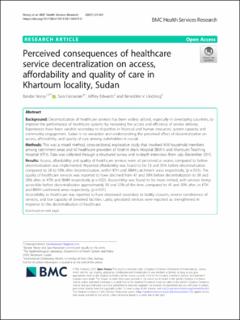| dc.contributor.author | Noory, Bandar | |
| dc.contributor.author | Hassanain, Sara A. | |
| dc.contributor.author | Edwards, Jeffrey | |
| dc.contributor.author | Lindskog, Benedikte V | |
| dc.coverage.spatial | Sudan, Khartoum. | en_US |
| dc.date.accessioned | 2021-06-24T10:57:38Z | |
| dc.date.available | 2021-06-24T10:57:38Z | |
| dc.date.created | 2021-06-20T20:13:20Z | |
| dc.date.issued | 2021-06-17 | |
| dc.identifier.citation | BMC Health Services Research. 2020, 21, (1-15). | en_US |
| dc.identifier.issn | 1472-6963 | |
| dc.identifier.uri | https://hdl.handle.net/11250/2761104 | |
| dc.description.abstract | Background: Decentralization of healthcare services has been widely utilized, especially in developing countries, to improve the performance of healthcare systems by increasing the access and efficiency of service delivery. Experiences have been variable secondary to disparities in financial and human resources, system capacity and community engagement. Sudan is no exception and understanding the perceived effect of decentralization on access, affordability, and quality of care among stakeholders is crucial.
Methods: This was a mixed method, cross-sectional, explorative study that involved 418 household members among catchment areas and 40 healthcare providers of Ibrahim Malik Hospital (IBMH) and Khartoum Teaching Hospital (KTH). Data was collected through a structured survey and in-depth interviews from July–December 2015.
Results: Access, affordability and quality of healthcare services were all perceived as worse, compared to before decentralization was implemented. Reported affordability was found to be 53 and 55% before decentralization compared to 24 to 16% after decentralization, within KTH and IBMH catchment areas respectively, (p = 0.01). The quality of healthcare services was reported to have declined from 47 and 38% before decentralization to 38 and 28% after, in KTH and IBMH respectively (p = 0.02). Accessibility was found to be more limited, with services being accessible before decentralization approximately 59 and 52% of the time, compared to 41 and 30% after, in KTH and IBMH catchment areas respectively, (p = 0.01).
Accessibility to healthcare was reported to have decreased secondary to facility closures, reverse transference of services, and low capacity of devolved facilities. Lastly, privatized services were reported as strengthened in response to this decentralization of healthcare.
Conclusions: The deterioration of access, affordability and quality of health services was experienced as the predominant perception among stakeholders after decentralization implementation. Our study results suggest there is an urgent need for a review of the current healthcare policies, structure and management within Sudan in order to provide evidence and insights regarding the impact of decentralization. | en_US |
| dc.language.iso | eng | en_US |
| dc.publisher | BMC | en_US |
| dc.relation.ispartofseries | BMC Health Services Research;21:581 | |
| dc.rights | Navngivelse 4.0 Internasjonal | * |
| dc.rights.uri | http://creativecommons.org/licenses/by/4.0/deed.no | * |
| dc.subject | Devolution | en_US |
| dc.subject | Implementation | en_US |
| dc.subject | Access | en_US |
| dc.subject | Health services affordability | en_US |
| dc.subject | Health services qualities | en_US |
| dc.subject | Stakeholders | en_US |
| dc.title | Perceived consequences of healthcare service decentralization on access, affordability and quality of care in Khartoum locality, Sudan | en_US |
| dc.type | Peer reviewed | en_US |
| dc.type | Journal article | en_US |
| dc.description.version | publishedVersion | en_US |
| dc.rights.holder | © The Author(s). 2021. | en_US |
| dc.source.articlenumber | 581 | en_US |
| cristin.ispublished | true | |
| cristin.fulltext | original | |
| cristin.qualitycode | 2 | |
| dc.identifier.doi | https://doi.org/10.1186/s12913-021-06479-0 | |
| dc.identifier.cristin | 1917066 | |
| dc.source.journal | BMC Health Services Research | en_US |
| dc.source.volume | 21 | en_US |
| dc.source.pagenumber | 15 | en_US |

